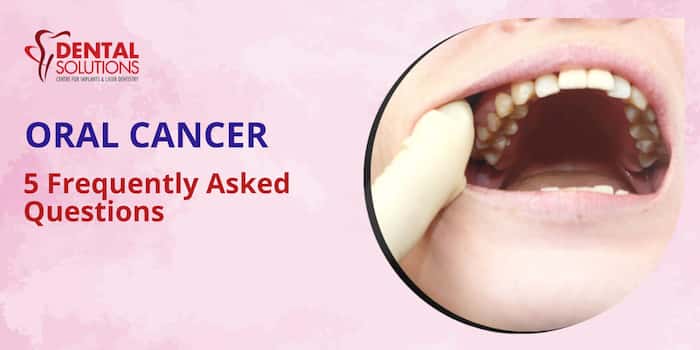- +917892951808
- Indiranagar, Bangalore
Best Dental Clinic In Bangalore Indiranagar | Best Dentist in Bangalore Indiranagar
- Home
- About Us
- Treatments
- Blog
- Contact Us
Oral Cancer – 5 Frequently asked questions

Oral cancer belongs to a larger group of cancers called head and neck cancers.
It is a cancer that develops in the tissues of the mouth or throat — in the mouth, oral cancer can be found on the lip, nasal cavity, floor of the mouth, roof of the mouth, cheek lining, gingiva, palate or on the tongue; in the throat area, it is found at the back of the mouth (known as the oropharynx).
Globally, oral cancer is listed as the sixth most common type of cancer, with India being the second country having the highest number of oral cancer cases. In India, around 77,000 new cases and 52,000 deaths are reported annually due to mouth cancer. (Source: NCBI – Data as of September 2020).
As the cancer progresses, it can involve the bones of the upper or lower jaw, it can spread to lymph nodes in the neck, or can spread elsewhere in the body. Most oral cancers come from the lining on the inside of the mouth.
Here are the top 5 Frequently Asked Questions (FAQs) about Oral Cancer:
1. What Causes Oral Cancer?
While a lot of people believe that oral cancer is only closely tied to excessive use of tobacco and alcohol, here are some of the causes of oral cancer that you must be aware of:
– Smoking and alcohol: Did you know, tobacco smokers are six times more likely to develop oral cancer than nonsmokers?
Tobacco and alcohol are carcinogenic, which means they contain chemicals that damage the DNA in the cells and lead to the formation of cancer.
If you are an excessive consumer of both smoking and alcohol, the risk of mouth cancer doubles.
– Smokeless tobacco users: Smokeless tobacco includes chewing tobacco and snuff (tobacco meant to be inhaled through the nose). If you think smokeless tobacco is harmless, you are wrong! Users who snuff, or chew tobacco products are equally likely to develop oral cancer, (or sometimes the cancer growth rate is higher in this case)
– Family history of cancer
– Unhealthy diet (which includes excessive consumption of junk food and aerated drinks)
– Human papillomavirus (HPV): a group of viruses that affect the skin and moist membranes inside the body. The infection is contracted via sexual contact with a person who's already infected, just skin-to-skin contact can also spread this infection.
– Poor oral hygiene: It doesn't simply mean brushing and flossing regularly. It also means taking proper care of your mouth – Cavity-filled teeth, broken teeth, can cause persistent ulcers or wounds on the tongue, this can increase the chances of developing mouth cancer. It's therefore very important to do everything you can to keep your mouth and teeth healthy.
– Smoking and alcohol: Did you know, tobacco smokers are six times more likely to develop oral cancer than nonsmokers?
Tobacco and alcohol are carcinogenic, which means they contain chemicals that damage the DNA in the cells and lead to the formation of cancer.
If you are an excessive consumer of both smoking and alcohol, the risk of mouth cancer doubles.
– Smokeless tobacco users: Smokeless tobacco includes chewing tobacco and snuff (tobacco meant to be inhaled through the nose). If you think smokeless tobacco is harmless, you are wrong! Users who snuff, or chew tobacco products are equally likely to develop oral cancer, (or sometimes the cancer growth rate is higher in this case)
– Family history of cancer
– Unhealthy diet (which includes excessive consumption of junk food and aerated drinks)
– Human papillomavirus (HPV): a group of viruses that affect the skin and moist membranes inside the body. The infection is contracted via sexual contact with a person who's already infected, just skin-to-skin contact can also spread this infection.
– Poor oral hygiene: It doesn't simply mean brushing and flossing regularly. It also means taking proper care of your mouth – Cavity-filled teeth, broken teeth, can cause persistent ulcers or wounds on the tongue, this can increase the chances of developing mouth cancer. It's therefore very important to do everything you can to keep your mouth and teeth healthy.
2. What are the Symptoms of Oral Cancer?
The most common symptoms of oral cancer are:
– A mass or an unusual growth anywhere in your mouth
– Sore mouth ulcers that do not heal for weeks
– Lumps in the lymph glands of the neck that do not go away
– Dysphagia – pain or difficulty swallowing
– Unexplained weight loss (this could be a dramatic weight loss)
– Numbness or bleeding in the mouth
– A tooth socket that does not heal weeks after the extraction
– Gum recession or loose teeth
– Moving your jaw becomes difficult
– Red or white patches on the lining of your mouth.
These signs and symptoms do not necessarily mean one is suffering from oral or mouth cancer, they could be caused by less serious conditions, such as an infection. However, unexplained and persistent signs such as these can sometimes turn into cancer, hence, it's important to see a doctor, especially if the symptoms have lasted for longer than 2-3 weeks.
– A mass or an unusual growth anywhere in your mouth
– Sore mouth ulcers that do not heal for weeks
– Lumps in the lymph glands of the neck that do not go away
– Dysphagia – pain or difficulty swallowing
– Unexplained weight loss (this could be a dramatic weight loss)
– Numbness or bleeding in the mouth
– A tooth socket that does not heal weeks after the extraction
– Gum recession or loose teeth
– Moving your jaw becomes difficult
– Red or white patches on the lining of your mouth.
These signs and symptoms do not necessarily mean one is suffering from oral or mouth cancer, they could be caused by less serious conditions, such as an infection. However, unexplained and persistent signs such as these can sometimes turn into cancer, hence, it's important to see a doctor, especially if the symptoms have lasted for longer than 2-3 weeks.
3. How is oral cancer diagnosed?
Oral cancer in its early stages can sometimes be difficult to diagnose because many people usually experience mild symptoms and tend to ignore them considering them normal dental issues. Therefore, it is important to see your dentist regularly (especially if you are a smoker or drinker) as most of the oral cancers are first diagnosed during a physical examination by the dentists.
If a suspicious area is found, your dentist might take a biopsy for laboratory testing. The biopsy will be analyzed for cancer or any precancerous changes.
In addition, there could be several blood tests, imaging tests – X-rays, MRIs, endoscopy taken in order to make an accurate diagnosis and prepare the best possible dental treatment for your case.
The oral cancer stages are indicated starting with I through IV. Stage I, indicates a smaller cancer, maybe confined to a certain specific area. Stage IV, indicates that the cancer has spread to other areas of the body and needs immediate attention.
If a suspicious area is found, your dentist might take a biopsy for laboratory testing. The biopsy will be analyzed for cancer or any precancerous changes.
In addition, there could be several blood tests, imaging tests – X-rays, MRIs, endoscopy taken in order to make an accurate diagnosis and prepare the best possible dental treatment for your case.
The oral cancer stages are indicated starting with I through IV. Stage I, indicates a smaller cancer, maybe confined to a certain specific area. Stage IV, indicates that the cancer has spread to other areas of the body and needs immediate attention.
4. How is Oral Cancer Treated?
Oral cancer is treated with one therapy or a combination of therapies, depending on the advancement of the cancer or the stage. Surgery is the most common treatment used to treat oral cancer often in combination with chemotherapy or radiation therapy, or targeted therapy.
Some of the surgical procedures for oral cancer are:
– Removal of the tumor resection and the surrounding infected tissue
– Mohs micrographic surgery — which is mostly recommended to treat cases of lip cancer
– Mandibulectomy — a surgery to remove all or part of the jaw if there is a tumor involving the jaw.
– Glossectomy — a surgery to treat tongue cancer. A small or large part of the tongue may be removed
– Maxillectomy – a surgical procedure to treat cancer inside the mouth (Oral cavity), nasal cavity or pockets found in the bones of the face (maxillary sinuses)
For more information on Oral Cancer treatment in Bangalore, contact us via our contact page.
Some of the surgical procedures for oral cancer are:
– Removal of the tumor resection and the surrounding infected tissue
– Mohs micrographic surgery — which is mostly recommended to treat cases of lip cancer
– Mandibulectomy — a surgery to remove all or part of the jaw if there is a tumor involving the jaw.
– Glossectomy — a surgery to treat tongue cancer. A small or large part of the tongue may be removed
– Maxillectomy – a surgical procedure to treat cancer inside the mouth (Oral cavity), nasal cavity or pockets found in the bones of the face (maxillary sinuses)
For more information on Oral Cancer treatment in Bangalore, contact us via our contact page.
5. Is there a chance my cancer could come back?
There is a possibility of cancer recurrence. Hence, it is of utmost importance to have regular follow-up visits with your dentists so they can monitor you closely after the treatment. This is especially important in the first two years, when the risk of recurrence is highest.
These are a few of the many questions people have regarding oral cancer. Do you have more questions? Ask them away! We are happy to answer them all for you.
We are a multi-speciality dental clinic based in Bangalore. We provide 360° dental solutions. Have your missed your recent dental appointment? We are one call away – 080 4110 0376
These are a few of the many questions people have regarding oral cancer. Do you have more questions? Ask them away! We are happy to answer them all for you.
We are a multi-speciality dental clinic based in Bangalore. We provide 360° dental solutions. Have your missed your recent dental appointment? We are one call away – 080 4110 0376
